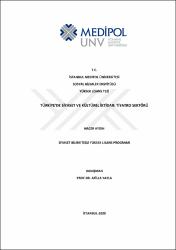| dc.contributor.advisor | Yayla, Atilla | |
| dc.contributor.author | Aydın, Hacer | |
| dc.date.accessioned | 2021-08-24T11:59:33Z | |
| dc.date.available | 2021-08-24T11:59:33Z | |
| dc.date.issued | 2020 | en_US |
| dc.date.submitted | 2020 | |
| dc.identifier.citation | Aydın, H. (2020). Türkiye'de siyaset ve kültürel iktidar: Tiyatro sektörü. (Yayınlanmamış yüksek lisans tezi). İstanbul Medipol Üniversitesi Sosyal Bilimler Enstitüsü, İstanbul. | en_US |
| dc.identifier.uri | https://hdl.handle.net/20.500.12511/7954 | |
| dc.description.abstract | Bu tez çalışması, Türkiye özelinde, merkezi ulus devletlerde, modernleşme projeleri kapsamında, bir ulus kimlik yaratabilmek için düzenlenmiş bir dizi faaliyetten biri olan sanatın ve onun özelinde tiyatronun, iktidar ve siyaset ile ilişkisini konu edinmiştir. 19.yüzyılla birlikte ortaya çıkan vatandaşlık hakkının soyut bir kimlik projesine dahil olmakla kazanıldığı ve bu sürecin dışında kalanların, iktidarın kültürel değişim baskısıyla karşılaşmasını inceler. Tez, disiplinleri ve okumaları, aynı zamanda farklı zaman dilimlerini bir araya getirerek harmanlamaya çalışmıştır. İktidar ve kültür, sanat ve siyaset arasındaki organik bağı gösterirken, Fransız modernleşmesinin, Türk modernleşmesi üzerindeki tarihsel etkisini ve kültürel iktidar kurmadaki benzerliklerini de ortaya koymuştur. 20.yüzyılda geniş topraklara sahip imparatorlukların hızla çözülmesiyle birlikte pek çok ulus devlet ortaya çıkmıştır. Osmanlı İmparatorluğu da çeşitli savaşlar sonunda hem toprak kaybetmiş hem de devasa imparatorluk çözülerek yerine modern bir ulus devlet olan Türkiye Cumhuriyeti kurulmuştur. Bu çalışma son dönem Osmanlı modernleşmesinin, Türk ulus devleti modernleşmesinin bir nesil önceki akrabası olduğunu da ortaya koymuştur. Yeni ulus devletin ideolojisi olan Kemalizm'e ve onun kültürel iktidar kurmadaki başarısına ve başarısızlığına da değinmiştir. Bu tez, aynı zamanda, Fransız modernleşmesinden benzerlikler ve öykünmeler ile iki farklı milletin aynı tarz modernleşmeye tabi tutulmasını da konu edinir. Tüm insanlık için ortak ve evrensel bir değer olarak kabul edilen modernlik projesinden tüm ulus devletler nasibini almıştır. Türkiye Cumhuriyeti de eksiksiz üstelik fazlasıyla nasibini almıştır. Dolayısıyla geleneğe dair kabul ettiği her şeyi reddetmiştir. En nihayetinde 'kültürel iktidar' kurmanın, kültür tanımının en saf hali olan 'insanın tekamülü'ne atıftan ziyade modern olmak ve ulus devlet kurmak ile neredeyse aynı şey olduğunu, soyut bir kimlik kurma projesi kapsamında ortaya çıktığını göstermeye çalışmıştır. Bu çalışma tiyatronun kültürel iktidar kurma ve siyaset açısından en işlevsel bir sanat dalı olduğunu, açık açık modernleşmenin bir terbiye aracı haline getirildiğini ortaya koymuştur. | en_US |
| dc.description.abstract | This thesis, in particular Turkey, in the center of the nation state as part of the modernization projects, tackles the relationship between power and politics with the theater and the art which is one of a range of activities designed to create a national identity. It examines that the citizenship right that emerged with the 19th century has been acquired by participating in an abstract identity project and that those who are out of this process encounter the pressure of the "cultural change" of the government. This study has tried to blend different disciplines and readings by combining different time periods. While "power and culture" shows the organic link between "art and politics", it also revealed the historical effect of French modernization on Turkish modernization and its similarities in establishing cultural power. With the rapid dissolution of empires which has vast lands in the 20th century, many nation states emerged. At the end of various battles, the Ottoman Empire both lost territory and solved colossal empire, instead of the Ottoman, the Republic of Turkey which is a modern nation-state was founded. This study has revealed that the recent Ottoman modernization was a relative of the Turkish nation-state modernization a while ago and the relationship between them. It also touched on Kemalism, the ideology of the new nation-state, and its success and failure in establishing cultural power. This thesis also deals with the similarity and emulations of French modernization and the same style of modernization of two different nations. All the nation states got their share from the project of modernity, which is considered as a common and universal value for all humanity. The Republic of Turkey has received more than its share even in complete. Therefore, it rejected everything he accepted about tradition. Ultimately, this thesis tried to show that establishing 'cultural power' is almost the same as being modernand establishing a nation state, rather than referring to 'human development', which is the purest form of the definition of culture, emerged as part of an abstract identity project. This study has revealed that theater is the most functional art form in terms of establishing cultural power and politics, and bluntly modernization has been turned into a manners tool. | en_US |
| dc.language.iso | tur | en_US |
| dc.publisher | İstanbul Medipol Üniversitesi Sosyal Bilimler Enstitüsü | en_US |
| dc.rights | info:eu-repo/semantics/openAccess | en_US |
| dc.subject | İktidar | en_US |
| dc.subject | Kültür | en_US |
| dc.subject | Siyaset | en_US |
| dc.subject | Tiyatro | en_US |
| dc.subject | Sanat | en_US |
| dc.subject | Modernleşme | en_US |
| dc.subject | Ulus | en_US |
| dc.subject | Devlet | en_US |
| dc.subject | Power | en_US |
| dc.subject | Culture | en_US |
| dc.subject | Politics | en_US |
| dc.subject | Theater | en_US |
| dc.subject | Art | en_US |
| dc.subject | Modernization | en_US |
| dc.subject | Nation | en_US |
| dc.subject | State | en_US |
| dc.title | Türkiye'de siyaset ve kültürel iktidar: Tiyatro sektörü | en_US |
| dc.title.alternative | Cultural power and politics in Turkey: Theater sector | en_US |
| dc.type | masterThesis | en_US |
| dc.department | İstanbul Medipol Üniversitesi, Sosyal Bilimler Enstitüsü, Siyaset Bilimi Ana Bilim Dalı | en_US |
| dc.relation.publicationcategory | Tez | en_US |


















